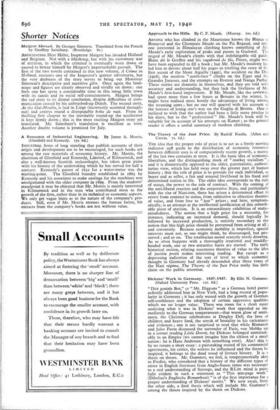Dickens' Work in Germany. 1837-1937. By Ellis N. Gtunmer. (Oxford
University Press. I25. 6d.) "DER geniale Boz," or "Mr. Digguns " as a German hotel porter ardently addressed him in New York, had a long record of popu- larity in Germany ; it has only waned with the growth of German self-confidence and the adoption of certain aggressive qualities which we no longer value. There was room for a short essay analysing what it was in Dickens' work that appealed so im- mediately to the German temperament—that warm glow of senti- ment, the Christmas celebrations at Dingley Dell, the love of children and heavy food, the streak of 'brutality in his caricatures and violences ; one is not surprised to read that while Bismarck and Jules Favre discussed the surrender of Paris, von Moltke sat in a corner reading Little Dorrit, for Dickens belonged unmistak- ably to an Empire (we cannot imagine him the citizen of a small nation : he is Hans Andersen with something over). Alas! this is by no means a short essay : a painstaking record of his commercial agreements, his critics, the writers he influenced and the theses he inspired, it belongs to the dead wood of literary history. It is a thesis on theses. Mr. Gummer, we feel, is temperamentally akin to Fiedler, who considered that a history of the different types of miser in English literature from Anglo-Saxon times was necessary to a real understanding of Scrooge, and the B.Litt, mind is pain- fully evident in such a statement as "This goo-page work" (Dibelius's Englische Romankust)" is of the first importance for a proper understanding of Dickens' merits." We now await, from the other side, a final thesis which will include Mr. Gummer's among the theses inspired by the thesis on Dickens.


































 Previous page
Previous page